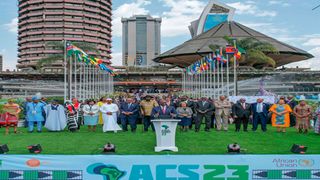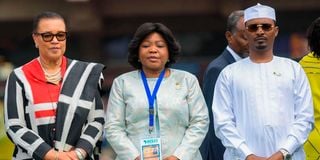
President of Kenya William Ruto (C) surrounded by other African leaders delivers his closing speech during the closure of the Africa Climate Summit 2023 at the Kenyatta International Convention Centre in Nairobi on September 6, 2023.
| PCSClimate talks: These are our demands, African leaders tell West
The three-day Africa Climate Summit ended on September 6, 2023, in Nairobi with a strong call for sweeping changes to global financing, as leaders presented a wish list to major polluters, saying they must honour their past commitments and be ready to make new ones to curb the accelerating effects of climate change.
In an equally strong voice, led by President William Ruto, the leaders called for an overhaul of the world’s debt financing system, including 10-year debt relief periods and options to renegotiate deals, which they said should tilt the scales in favour of a naturally endowed continent that pays up to five times more for loans on the global market.
The leaders called for a tenfold increase in financing, with a target of 300 gigawatts (GW) of renewable energy by 2030, up from the current 56GW.
The summit, held at the Kenyatta International Convention Centre (KICC), lamented that Africa has consistently received the short end of the stick when it comes to global funding and compensation for the effects of climate change.
The summit - attended by at least 15 presidents, UN Secretary-General António Guterres and US climate envoy John Kerry - will now be a biennial event led by the African Union, and its decisions will form the basis of the continent’s push at the UN Climate Change Conference (COP28) in Dubai in November.
The united African voice is also expected to give momentum to a series of key meetings, including the G20 meeting in New Delhi this weekend, ahead of the crucial November UN climate summit in the oil-rich United Arab Emirates (UAE).
While Africa attracted only two per cent of global spending on renewables over the last decade, the leaders demanded a change to the global financing limits, and a review of the debt terms.
Facing mounting debt costs and a dearth of funds, African leaders called for a complete overhaul of the global financial architecture, adding to pressure on the International Monetary Fund (IMF) and World Bank to unlock investment and climate finance.
The declaration called for “concrete action” on reforms that lead to “a new financing architecture that is responsive to Africa’s needs”, including debt restructuring and a 10-year relief.
Specifically, the Nairobi Declaration called for a Sh94 trillion ($650b) Special Drawing Rights (SDR) liquidity mechanism to “build resilience to climate shocks”, in a facility that will be equal to the one provided to the continent during the Covid-19 scourge.
Similarly, the leaders demanded that Multilateral Development Banks scale up concessional financing to Sh72.95 trillion ($500b) a year.

From left: Commonwealth Secretary-General Patricia Scotland, Angolan Vice-President Esperança da Costa,and Chad’s transitional President Mahamat Idriss Déby Itno at the KICC in Nairobi on September 6, 2023.
“We call upon a concrete time bound action on the proposals to reform the multilateral financial system currently under discussion specifically to new debt relief interventions and instruments to pre-empt debt default with the ability to extend sovereign debt tenor; and include a 10-year grace period,” the leaders said in the statement read by President William Ruto.
Similarly, they demanded the inclusion of ‘debt pause clauses’, to a continent whose debt has more than tripled since 2010.
“Africa possesses both the potential and the ambition to be a vital component of the global solution to climate change,” said the final declaration from the meeting, on behalf of the African Union.
But, it warned, unlocking green growth across the continent “on a scale that can contribute meaningfully to decarbonisation of the global economy” required a massive scaleup in funding.
“At the summit, our shared understanding became clear: that Africa is not only the cradle of humanity, it is indeed the future,” said President Ruto, who hosted the inaugural Africa Climate Summit.
Efforts at the summit to up investment in renewables were given a boost on Tuesday, with the United Arab Emirates pledging $4.5 billion to accelerate Africa’s switch to clean energy.
President Ruto said a tally of funding pledges for the continent had reached $23 billion at the summit, but he did not provide a detailed breakdown.
Competing visions of the world’s energy future are likely to play out at the COP28 talks in the oil-rich UAE, where the world will take stock of the as-yet-inadequate efforts to slash planet-heating emissions.
President Ruto has said Africa is well placed to take advantage of the need to move away from carbon-spewing fossil fuels, boasting a young population, vast renewable potential and natural resources.
This includes a large proportion of global reserves of cobalt, manganese and platinum crucial for batteries and hydrogen fuel cells.
The International Energy Agency (IEA) says Africa hosts 60 percent of the world’s best solar resources.
Daunting challenges
But there are daunting challenges for a continent where hundreds of millions lack access to electricity.
“We demand a fair playing ground for our countries to access the investment needed to unlock the potential and translate it into opportunities,” President Ruto said.
Leaders also pressed the world’s wealthy polluters to honour their pledges, including to provide $100 billion a year for clean energy and to help them brace for climate disasters.

A delegate uses his smart phone to record proceedings during the final day of the Africa Climate Summit at the Kenyatta International Convention Centre in Nairobi on September 6, 2023.
In a report released this week Oxfam said the devastating drought in the Horn of Africa as well as floods in South Sudan, have caused losses of between $15 billion and $30 billion in the two years to 2022, or around two to four percent of the region’s GDP.
It estimated that between 2021 and 2023 the four countries lost about $7.4 billion in livestock alone.
“Millions of already struggling people saw their animals die and lost their ability to grow, sell or eat nutritious food, plunging them into even greater poverty and hunger,” the report said.
Growing rapidly
Noting that African cities and urban centres were growing rapidly and will be home to one billion people by 2050, the Nairobi Declaration called for urgent action to achieve the goal of access to electricity.
Nearly 600 million Africans still lack access to electricity, while 970 million lack access to clean water for cooking.
“Home to the world’s youngest and fastest-growing workforce, coupled with massive untapped renewable energy potential, abundant natural resources and entrepreneurial spirit, our continent has the foundations to lead the way on a climate-positive pathway as a thriving, low-cost industrial hub with the capacity to support other regions in achieving their net-zero ambitions,” the leaders said.
The Nairobi Declaration also decided that the Africa Climate Summit will be a biennial event convened by the African Union and hosted by AU member states “to set the continent’s new vision taking into consideration emerging global climate and development issues.”
“We decide that this Declaration will serve as a strong contribution from the African continent to the global climate change process, COP 28 and beyond,” they said, welcoming Dubai’s COP28, and the promise it brings.
Additional reporting by AFP





